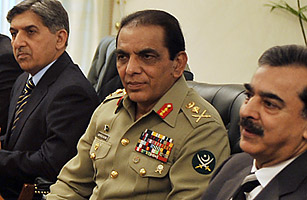
It has been a grim seven weeks for Pakistan’s powerful generals. The unilateral raid on Osama bin Laden’s compound opened them up to charges of complicity abroad and a sense of deep embarrassment at home. The criticism sharpened after a major terrorist attack on a naval base in the southern port city of Karachi, with many critics unfavorably contrasting the privileges the military enjoys against its recent failures to provide security. And then long-standing suspicions of the security establishment’s darkest side were first heightened by the murder of journalist Saleem Shahzad, who had warned of threats to his life from the military’s leading spy agency. All that foreboding seemed to be affirmed by a chilling video showing paramilitary rangers shooting dead a youth in Karachi in broad daylight.
“It’s amazing the level of criticism that the military leadership is facing,” says Talat Masood, a retired lieutenant general turned analyst. “It’s clearly the worst in its history,” he adds, reflecting on the decades since he joined the Pakistan army in the 1950s. For General Ashfaq Parvez Kayani, the Pakistan Army chief, the current mood is particularly galling. Since being elevated to the most powerful office in Pakistan, Kayani has carefully worked to rebuild his institution’s image after the ruinous final years of President-cum-General Pervez Musharraf’s military rule. At home and abroad, he won plaudits for renewing a commitment to fighting Islamist militancy, with successful military operations in the Swat Valley and much of South Waziristan. While he has made a series of interventions backstage, Kayani has shunned an overtly political role.